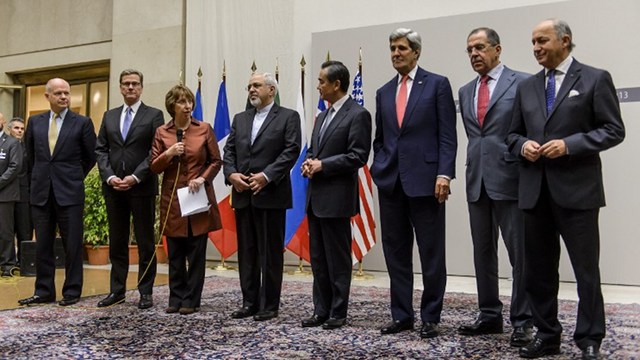SUMMARY
This is AI generated summarization, which may have errors. For context, always refer to the full article.

VIENNA, Austria – Iran and world powers held a new round of nuclear talks Tuesday, April 8 hoping to move to the next level and start drafting a historic but highly ambitious final deal next month.
Threatening to drive a wedge between the powers, however, is the crisis over Ukraine, which has led to the biggest standoff between Russia and the West since the Cold War.
Iran and the 5 UN Security Council permanent members plus Germany want to transform a temporary accord struck in November into a permanent agreement before it lapses on July 20.
Doing so is a tall order, however, requiring both sides to tackle thorny issues that will severely test their willingness and ability to give ground.
Iranian Foreign Minister Mohammad Javad Zarif said Tuesday that he has formed a group of legal experts to help in the “complicated, difficult and slow work” of drafting a deal.
A spokesman for the powers’ chief negotiator, EU foreign policy chief Catherine Ashton, said this round, expected to last two days, was to “explore our respective positions on each topic”.
Ashton and Zarif held a working dinner on Monday evening, her spokesman told reporters in Vienna.
A senior US official involved in the talks said Friday she was “absolutely convinced” a deal could be reached and that both sides were “looking toward beginning drafting in May”.
But “the real issue is not about whether you can write the words on paper, do the drafting. It’s about the choices that Iran has to make, and some of them are very difficult.”
Under the November deal, which took effect on January 20, Iran froze certain nuclear activities for 6 months in exchange for minor relief from sanctions hurting its economy.
Now the powers want Iran to reduce permanently, or at least long-term, the scope of its program in order to make any dash to make the bomb extremely difficult and easily detectable.
Iran in return wants all sanctions lifted.
The deal may involve Iran slashing the number of centrifuges — machines “enriching” nuclear material — changing the design of a new reactor at Arak and giving UN inspectors more oversight.
Hardliners
Any deal that sees Iran giving too much away risks losing Iranian President Hassan Rouhani — who since taking office last year has sought to improve ties with the West — or the supreme leader.
But leaving too much — or indeed any — of Iran’s nuclear infrastructure intact would be hard to sell to skeptical US lawmakers, and to US ally Israel, the Middle East’s sole if undeclared nuclear power.
So far, the 6 powers have shown a united front. But Moscow’s annexation of Crimea last month has sent relations between Russia and the West into a tailspin.
Following the latest unrest in the east, with pro-Russian activists storming government buildings, the White House on Monday warned Moscow against efforts to “destabilize Ukraine“.
The Kremlin swatted the accusations aside, warning the pro-Western government in Kiev against any use of force and saying Tuesday there was a “risk of unleashing civil war”.
Russia’s chief negotiator, Sergei Ryabkov, fired a warning shot last month, saying Moscow might “take the path of counter-measures” on Iran if pushed too far.
On Tuesday however Ryabkov sounded a more conciliatory note, telling ITAR-TASS it would “not be wise” to turn Iran into a “bargaining chip”.
Russia was not involved in the Iran talks “to please the Americans or Iranians” but because it “meets the national interest” to find a solution, he said.
Moscow and Iran are said to be negotiating an oil-for-goods barter deal that would undermine Washington’s sanctions efforts, a strategy the US credits with getting Iran to talks in the first place. – Rappler.com
Add a comment
How does this make you feel?
There are no comments yet. Add your comment to start the conversation.